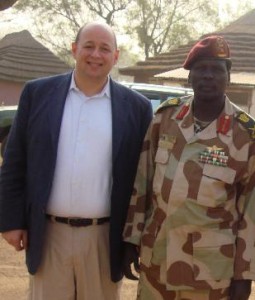UPI | 29 April 2010
NAIROBI, Kenya -- Rich Arab states such as Saudi Arabia have bought huge tracts of land across Africa in recent years in a bid to combat global food shortages, water scarcity and desertification and feed their burgeoning populations.
But now the scramble for Africa is intensifying, with investment banks, hedge funds, commodity traders, sovereign wealth funds, corporations and business tycoons out to grab some of the world's cheapest land -- for profit.
China has leased 6.91 million acres in the Democratic Republic of Congo for the world's largest oil palm plantation.
South Korea's Daewoo conglomerate planned to buy 2.9 million acres of Madagascar until the deal collapsed when rioters toppled the Indian Ocean island's government.
"Philippe Heilberg, CEO of the New York-based investment fund Jarch Capital ... has leased between 998,000 and 2.47 million acres in southern Sudan from the warlord Paulino Matip," Le Monde Diplomatique reported.
"Foreign direct investment in agriculture is the boardroom euphemism for the new land grab and those promoting the grab spin it as a win-win situation."
It quoted Heilberg as saying, "When food becomes scarce, the investor needs a weak state that does not force him to abide by any rules."
According to various assessments, up to 123.5 million acres of African land -- double the size of Britain -- has been snapped up or is being negotiated by governments or wealthy investors.
Ethiopia alone has approved 815 foreign-financed agricultural projects since 2007.
As African leaders, many out to line their own pockets, sign away their people's land to foreigners, the continent's people, among the poorest on the planet, face having to join the estimated 1 billion people in the world who don't have enough food.
In some cases, human rights groups say many of these deals are done in secret without consulting the people on the land being sold, often dispossessing them.
In the end, critics say, with African farmland in foreign hands, the continent faces widespread conflict over resources in the not-too-distant future.
"Food production in Arab countries is limited by scarce land and water resources," the World Bank said in recent report. "Arab countries are highly exposed to international food commodity price shocks … because they are heavily dependent on imported food."
Climate change is accelerating the decline in food production through water shortages, desertification, coastal flooding and changing weather patterns.
As populations expand while the amount of farmland and water supply shrinks, resource wars are expected to erupt across the Middle East and Africa in the years ahead.
"Unchecked land-grabbing carries with it the seeds of conflict, environmental disaster, political and social change, and hunger on an unprecedented scale," Le Monde Diplomatique warned.
As the foreign purchases of African land multiply unchecked, the United Nations and the World Bank are seeking to bring the land-grabbing under some sort of control.
In November, they started drawing up a code of conduct to regulate overseas investment in farmland, the first effort to put the brakes on the runaway land acquisitions by wealthy states such as Saudi Arabia, the United Arab Emirates and South Korea.
But critics view this as too little, too late.
The regulations aren't expected to be ready until late this year. Officials acknowledge the delay gives land-grabbers time to snap up more farmland before the code comes into force.
But even then, it will lack teeth because the regulations will be non-binding: the United Nations doesn't want to inhibit direct foreign investment in agriculture, which it believes can offer development opportunities.
The land-buying spree by the Arab states is likely to continue as desertification worsens.
Wadid Erian, a soil expert with the Arab Center for the Study of Arid Zones and Dry Land in Cairo, said that desertification is advancing swiftly "and our response needs to match the pace"
"The question we need to be asking is whether using (African) land is a sustainable, long-term solution … We expect that if climate change and desertification continue at this pace, in the next five years we won't have enough food to supply demand."
Continuing to amass Africa's arable land without ensuring that local populations in the world's hungriest continent reap any benefit, is not the sole long-term answer," Erian said.












